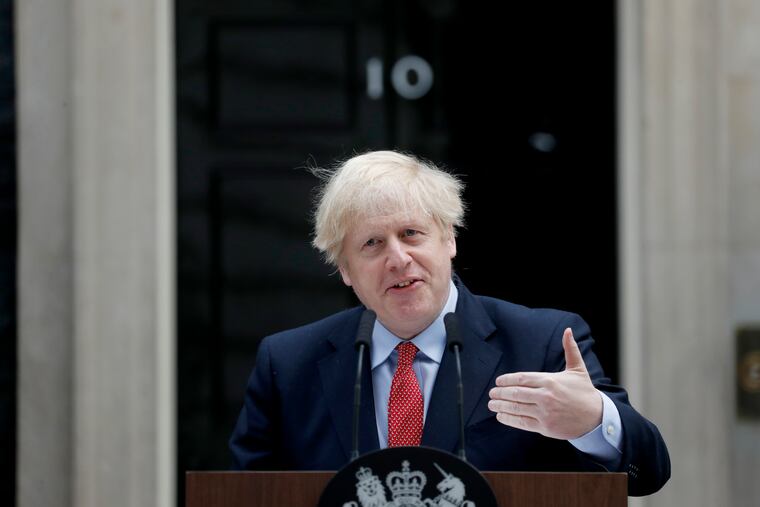Boris Johnson returns to work, urges Britain to maintain coronavirus lockdown
The prime minister warned that to lift a nationwide lockdown now would risk both a health crisis and an "economic disaster."

Prime Minister Boris Johnson returned to work Monday and moved to stamp his authority on a government under pressure over its handling of the U.K. coronavirus outbreak, warning that to lift a nationwide lockdown now would risk both a health crisis and an “economic disaster.”
Speaking exactly one month after he went into isolation with a case of COVID-19 that would go on to put him into intensive care, Johnson said the U.K. is close to having the outbreak under control, and urged people not to relax the social-distancing efforts that had achieved this. He compared the virus to a mugger, and said the nation had "begun together to wrestle it to the floor."
"This is the moment of opportunity," he said outside his Downing Street office. "This is the moment when we can press home our advantage. It is also the moment of maximum risk." Johnson warned that easing restrictions too soon could trigger a "second spike" of infections.
The prime minister has returned to find mounting public weariness with a lockdown that has closed most shops and all pubs and restaurants, and prevented people from meeting friends. There are growing calls for a path to restarting the economy among business owners and members of his own Conservative Party.
They point out that country has recorded its lowest daily death toll since March and that lockdowns are being partially lifted in countries around Europe. The government is due to review the restrictions on May 7.
But businesses are already "clamoring" for information, according to the Institute of Directors. A survey of more than 1,000 business leaders showed fewer than one in four were optimistic for their prospects over the next 12 months. Chancellor of the Exchequer Rishi Sunak is due to make a statement to Parliament on Monday on the economic impact of the lockdown.
Six business leaders, including Conservative Party billionaire donors Michael Spencer and Peter Hargreaves, have written to the government asking them to ease the restrictions, according to the Sunday Times.
But the prime minister was clear there will be no imminent relaxation of the current rules. Though he pointed to signs of success, including falling hospital admissions, he said it was important to be cautious.
"I want to get this economy moving as fast as I can, but I refuse to throw away all the effort and the sacrifice of the British people and to risk a second major outbreak and huge loss of life," Johnson said. "I ask you to contain your impatience because I believe we are coming now to the end of the first phase of this conflict. In spite of all the suffering, we have so nearly succeeded."
To move too early, he said, would risk not only "a new wave of death and disease, but also an economic disaster" if the government was forced to once again "slam on the brakes."
Johnson promised that, once officials are sure the virus is under control, there would be a "second phase" in which restrictions will be eased — even as efforts continue to suppress the disease. He said he couldn't offer more details on this, but promised to bring in opposition political parties and make decisions with "maximum possible transparency."
That was an apparent acknowledgment of mounting criticism of ministers' handling of the pandemic. Though the National Health Service hasn't been overwhelmed, the hospital death toll exceeds 20,000 — the level the government said would be considered a good outcome.
The government is trying to ramp up testing and begin a mass program of tracking and tracing COVID-19 cases to keep the outbreak under control once social-distancing rules are eased.